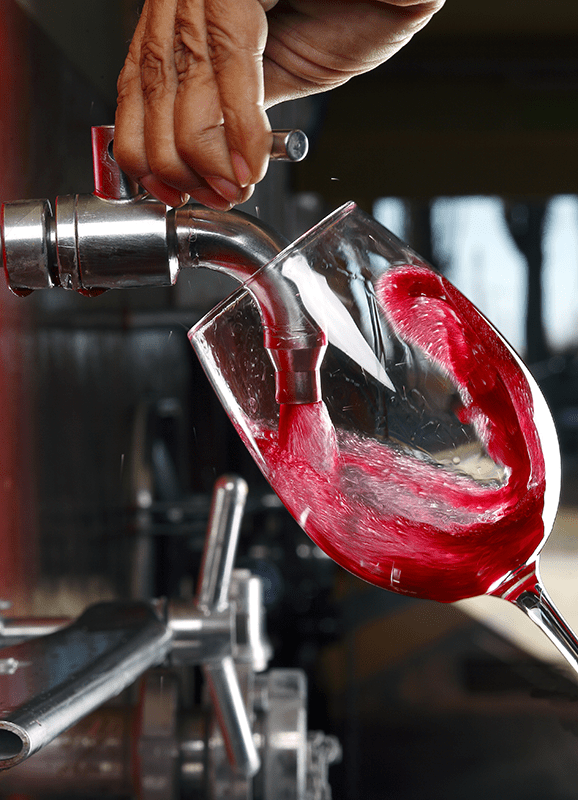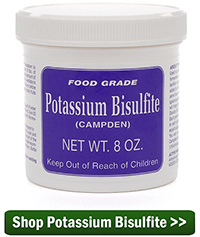 Sulfites are a very important part of wine making. They are commonly used in both commercial wine making and home wine making. They can be used in granulated form such as potassium metabisulfite or sodium metabisulfite. Also for the home winemaker, sulfites can be used in tablet form called Campden tablets.
Sulfites are a very important part of wine making. They are commonly used in both commercial wine making and home wine making. They can be used in granulated form such as potassium metabisulfite or sodium metabisulfite. Also for the home winemaker, sulfites can be used in tablet form called Campden tablets.
There are several reasons for using sulfites in the wine making process. They are extremely versatile and thus valuable in many ways. They act as a sanitizer in both the wine and on the equipment. Sulfites are also a protector against the damaging effects of oxygen.
Very briefly, when sulfite granules are added to a wine, sulfite gas is released and over time is passed through the liquid and escapes into the air.
One reason for using sulfites in wine making is sanitation. For example, you may want to consider adding it directly to your juice prior to making the wine. Any fruit juice can be riddled with natural yeasts, bacteria, or other microscopic critters that could wreak havoc on the quality of your finished wine if left up to their own devices. Adding sulfites directly to the wine will destroy unwanted organisms in the wine must so you don’t run the risk of ruining your wine before you’ve even begun.
Another reasons for using sulfites in wine making is to preserve your wine throughout the storage and aging process. Too much oxygen exposure to your wine can be problematic. It can cause it to become oxidized and lose many of its desired aromas and flavor characteristics while taking on undesired aromas, flavors, and colors.
By adding sulfites to the wine right before the bottling process, the sulfite gas molecules that are released into the wine have a opportunity to “push out” the excess oxygen into the atmosphere. Think of it as the sulfite gas acting like a big bully and pushing the oxygen out of its way so the sulfite can sit in the wine and not oxygen. In short, when using sulfites in your wine making in this way, you prolonging the life of your wine, thus allowing you to enjoy it for longer than if you hadn’t used the sulfites.
 There is a big myth floating around out there that sulfites cause headaches in people after drinking red wine, giving winemakers the idea of making sulfite free wine. So far, there is no credible evidence to support this idea, and it’s more likely that the histamines, tannins, or some other compound in red wine are causing some people to get headaches.
There is a big myth floating around out there that sulfites cause headaches in people after drinking red wine, giving winemakers the idea of making sulfite free wine. So far, there is no credible evidence to support this idea, and it’s more likely that the histamines, tannins, or some other compound in red wine are causing some people to get headaches.
It’s also important to point out that many dried fruits such as prune and apricots have significantly higher doses of sulfites than any wine – typically more that 10 times – so if you do not get headaches from eating such dried fruits, then they are not allergic to the sulfites in wine.
The point is: using sulfites in your wine making is a good think note a bad thing. Take advantage of it, and claim all the benefits they have to offer.
—–
Ed Kraus is a 3rd generation home brewer/winemaker and has been an owner of E. C. Kraus since 1999. He has been helping individuals make better wine and beer for over 25 years.

I like somewhat sweet wines and had one explode on me onetime. If I get a wine I like and it’s still fermenting, I pasteurize it. It works and the wine is good. What is your comment about pateurization?
Bill, heating a wine is not recommended simply for that fact that it can oxidize the wine. It is always best to let the fermentation complete and consume all the sugar in the wine. Let it clear. Rack it off the sediment Then add Campden tablets, potassium sorbate and sugar to sweetness. Then bottle!
re: adding sodium metabusulfite to juice prior to starting wine–is this for the juice concentrate or if you are crushing your own fruit?
Paul, great question. Adding sulfite to a wine must before the fermentation is only necessary when dealing with fresh fruit. It is not necessary when making wine from a concentrate. Having said this, sulfites will help to drive out any chlorine that is in the tap water you used, so if you have a lot chlorine in you municipal water, you may want to use sulfites anyway.
I have a batch of potato wine which I bottled with out adding a little sodium metabusulfite to kill any residual yeast as I was out. Now when I open a bottle it starts to ferment.. Can I open all bottles, dump into a carboy and then add metabusulfite to kill the yeast and then rebottle?
Tom, what you need to do is put the wine back into a fermenter and let the fermentation complete. If the fermentation did complete and you verified this with a hydrometer, then the fizzy you are seeing if from a bacterial infection. In that case sulfites need to be added to the wine to stop the infection from getting any worse.
How long after using sulfite in a finished wine should you wait to bottle or do you wait at all?
Scott, once the wine is clear and ready to bottle, you will add the sulfites and bottle immediately after adding.
We’ve added sulfites to our wine when we’ve bottled an I think it tastes different after the addition. I’ve bottled without adding the sulfites and I prefer the taste. Am I crazy to think there’s a difference? We do sanitize the bottles with sulfite and I do not rinse them after.
Laurie, adding sulfites in regular doses throughout the course of making and bottling a wine it is not enough to affect the flavor of the wine, but in extreme cases it could. I have not tasted a wine with this defect, but my guess is it would add a salty taste to the wine, however I do not know for sure.
I do not use sulfites in my Mead or red wine Never lost any bottles, I find if I fill the bottle right to the top with a screw top, no air or oxygen can enter the bottle.
could a small amount of sulfite be added to the bottle at bottling stage ?
Michael, you will want to add the sulfite to the wine while still in bulk just before bottling the wine. Because you add only 1/16 teaspoon to each gallon of wine it would be too difficult to add the appropriate amount to each bottle as not to add too much and would be very difficult to stir it into the wine.
I believe in using sulfites in my fresh berries . when I get the right taste you can chill the wine down for three or four days below 48 no lower than 38. you will keep that taste. and kill the yeast.
Sulfites are not good for a persons health. I quote this from Wikipedia: “In 1986, the Food and Drug Administration in the United States banned the addition of sulfites to all fresh fruit and vegetables that are eaten raw.”
All of the commercial wines that I have bought, have added sulfites, and they give me a headache, that’s why I make my own wine, without added sulfites.
I use a few drops of plain laundry bleach for sterilizing my wine bottles and equipment. I leave all of my empty wine bottles and fermentation bottles about 1/4 full of this very mild bleach solution. You don’t need hot water or sulfites for cleanliness. It kills fungi, bacteria, virals, and the vinegar bug. Just rinse your bottles and equipmant before using, very simple.
I have some wine that has reached its max fermentation.. but still has some residual sugar in the wine from using to much sugar initially.. Will Camden tablets (1 per gallon) kill the existing yeast enough to not worry about future fermentation after it’s bottled? Should I add something else to the wine before bottling to be safe?
Jason, unfortunately, adding campden tablets is no guarantee that the fermentation will not start up again at some point. Our recommendation is to get the fermentation to complete before bottling the wine. The article listed below will discuss this in detail and give you suggestions on how to get the fermentation going again.
Too Much Sugar
http://www.eckraus.com/blog/my-fermentation-has-too-much-sugar-what-should-i-do
If you’re getting ready to bottle a five gallon carboy of blackberry how many Camden tablets would you add just before bottling. I’m guessing you’d crush and dissolve the tablet into the wine.
James, the campden tablet dosage at bottling time is one tablet for every gallon of wine. It is best to crush the tablets, dissolve in a little water and mix thoroughly into the wine.
Hello,
The wine kit of Cabenet I am making had me add a small packet of potassium metabisulphite at the stabilizing/degassing phase.
If I intend to age the wine once bottled, should I be adding more right before bottling? Or is it only needed once?
Paul, in order to preserve the wine from spoiling, sulfites should be added at bottling time.